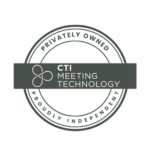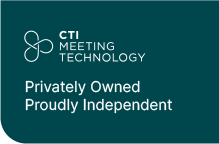Conference staffing goes beyond having enough people to handle tasks during the event. Imagine going to a concert by your favorite band. The musicians are the visible faces on stage, but much more happens behind the scenes. Audio engineers, venue organizers, stylists, truck drivers – all of them make up the staff team, and their collective efforts impact the overall success of the concert.
Your conference should be the same. Organizers need to make sure there’s someone responsible for all the moving parts of the event, ensuring the meeting runs smoothly. Event staff are vital to the attendee experience, customer service, event logistics, and ensuring attendee satisfaction.
The Diverse Responsibilities of Conference Staff
Many moving parts form a conference, so best practice is to allocate individuals specialized in each area. You will need staff for registration, check-in, room monitors, technical support and AV teams, and catering staff. In order to ensure everything runs smoothly, designate an event manager or coordinator to manage all the tasks and offer any help to staff members in need.
The Importance of Strategic Planning in Staffing
With strategic planning, event organizers can define staffing needs based on the size and objectives of the conference. This process involves understanding the event flow and all areas that require staffing support. Take enough time to plan your event in detail before jumping into any other projects.
Pre-Conference Preparation
Before the conference begins, organizers must prepare meticulously to ensure the event has the right staff. You might think the more event staff you have, the better. That’s not always the case. You have to mind your budget, and several people taking care of the same task might not be efficient. In fact, too many people in charge of a single task could lead to a bystander effect and halt the process all together!
First, prepare an extensive list of all the moving parts required to host a successful event. Hopefully, you have an exhaustive organizational plan that includes all the necessary tasks. Now, identify those areas that require extra staff – let it be onsite the day of the event or helping out remotely – and estimate how many people you will need for each of them.
Look at past events or research similar competitor-owned meetings to generate a reliable number. Mind your budget, but definitely do not cut down on staff in the most vital areas; this could lead to more problems.
Once you have defined a list of areas and the number of people you will need, start assigning roles and responsibilities to your team. Try to plan in advance and always have a plan B; you never know who might get sick or get a flat tire on their way to the event!
If you and your team have experience with this type of event, this next step might not be necessary (although a quick refresher never hurts). Implement a training plan for new staff. Nothing crazy; pair new staffers with someone who already had that role in the past years and take some time to explain each task in detail and go through some real examples and situations. Inform new staff about the problems that may appear on the day of the event and possible solutions. Role-play is the way to go here! Following a preparation plan before the big day will make your staff more confident and ensure they are well-versed in their tasks and responsibilities.
Key Conference Staff Positions
Conference staff members fulfill many responsibilities to ensure the event runs smoothly. From event coordinators to cleaning staff, all the moving parts work together to offer a pleasant experience for attendees. Each role contributes in a unique way to the overall success of the conference, and they look different depending on the nature of your event. Let’s explore some of these positions in more detail:
Event Managers and Coordinators
Event managers and coordinators are the eyes that oversee the entire event. They spot problems onsite, offer timely solutions, and act as a point of contact for staff members and stakeholders. Their tasks include logistical planning, vendor coordination, and budget management.
They contribute to the conference planning process from start to finish, developing a thorough knowledge of all the meeting components. Their expertise and ability to navigate unexpected challenges can significantly impact event success.
Registration and Check-In Staff
Registration and check-in staff are the face of the conference, greeting attendees and ensuring they get the help they need to navigate the check-in process. Have you ever gone to an appointment and had a not-so-pleasant interaction with the front desk? Yeah, you probably never want to go back there.
That is why you should be careful when choosing registration and check-in staff; they are the first faces your attendees see, and it will definitely set the tone for the rest of the conference. In addition, efficiency and attention to detail are crucial in ensuring a seamless check-in experience. Troubleshooting registration and answering attendees’ questions can make a difference in the event experience!
Ushers and Room Monitors
Ushers and room monitors assist attendees in finding their seats, managing crowd flow, and ensuring that sessions run smoothly. They monitor the crowd, ensure the attendees are comfortable, and handle logistical issues. They might inform other staff members to adjust volume and lights to make it a pleasant experience. Think about them as the “personal assistants” of attendees, enabling the maximum comfort. Their presence adds an extra layer of professionalism that enhances the overall attendee experience.
Technical Support and AV Teams
Technical support and AV teams play a crucial role in ensuring the smooth operation of the technical aspects of the conference. From setting up microphones and projects to troubleshooting sound, they ensure speakers can deliver their presentations without a hitch. Not only that, these staffers also monitor live streaming in hybrid events to make sure the content is reaching the audience at home. Even though they are behind the scenes, their expertise is essential to ensure the success of each session.
Catering and Hospitality Staff
Conferences are long. Your attendees need refreshments and meals in between sessions to fight fatigue, plus other hospitality services. The staff serve food and beverages, while accommodating dietary restrictions or allergies. Any extra service that you can think of – offering babysitting services for parents who have attend with children, for example – will set you apart from competitors, adding an extra touch of personalization and ensuring attendees have a positive experience during their breaks.
Effective Communication Strategies
Effectively communicating among conference staff members is vital to coordination, problem-solving, and event success. But communication can be tricky, especially with events that attract many attendees. Here are some key strategies to facilitate communication before and throughout the event:
Coordination and Communication Among Staff Members
Establish clear channels of communication to ensure that conference staff can collaborate effectively. Whether you hold regular team meetings or use platforms such as Slack, be sure your staff has the right tools to reach out to other members whenever they need. Assign a specific point of contact for each staff position, ensuring seamless communication during the event. An open and transparent communication system fosters a positive and productive work environment where everyone can voice their opinion and receive the support they need.
Preparing for Emergencies and Crisis Communication Plans
No matter how meticulously you plan, emergencies and unexpected situations happen. Draft a crisis plan to promptly and effectively address potential issues. This plan should include individuals responsible for managing emergencies and communication protocols. While this is a great tool to deescalate big problems at your conference, the key lies in effectively communicating it to the whole team. This way, everyone knows who’s responsible for what and can follow procedure when needed.
Customer Service Focus
Earlier, we discussed the importance of choosing the right staff and registration members for your conference, as they are the first faces your attendees will encounter. In general, onsite staff represent your organization during the event, so you want to be sure they deliver exceptional customer service to create a positive and memorable experience for attendees.
Train your staff extensively before the conference. Provide staff with the skills and knowledge necessary to interact with attendees professionally. Cover topics such as active listening, problem-solving, brand image, and managing difficult situations. And as most of your participants will come from different parts of the world, hiring staff that speak multiple languages is also a plus!
However, attendees can be a bit difficult to manage sometimes. In cases of upset or dissatisfied attendees, train staff members to handle these scenarios with professionalism and empathy. Go through hypothetical situations and allow them to resolve the conflict. The more scenarios you can practice before the conference, the better.
Utilizing Technology for Staffing Efficiency
Technology can be your best friend for increased staffing efficiency. Using scheduling platforms, organizers can easily spot understaffed shifts and reschedule them as needed, ensuring all the event areas are covered.
Event managers can also use mobile apps to communicate with staff members for more efficient information sharing. Venues are large, so it might take a long time to get from one room to another, whereas apps allow staff members to quickly and easily communicate with colleagues on the other side of the building. These tools save time and encourage staff members to be proactive and responsive.
Ensuring Diversity and Inclusivity
Diversity and inclusion are a hot topic for event planning this year; we have already covered how to make your events more inclusive in a previous blog post. A big part of ensuring attendees feel comfortable during your conference relies on crafting an environment that welcomes attendees of all backgrounds. By training staff members to be culturally sensitive, embracing diversity, and fostering inclusivity, conferences can become enriching experiences for a wide range of participants.
Not only that, but ensuring you have a diverse staff is the best way to ensure a comfortable environment for everyone. A diverse staff helps understand diverse cultural norms, debunk common misconceptions, and promote inclusivity through language and behavior. Creating an inclusive environment enhances the overall conference experience for all participants. Diverse speaker lineups, gender-neutral restrooms, accessibility accommodations, and clear policies against discrimination or harassment also contribute to an inclusive environment.
Logistical Planning and Execution
Organizers must create clear and well-defined staff schedules, ensuring sufficient coverage for all areas and times during the conference. Adequate planning and scheduling prevent overstaffing or understaffing, allowing for seamless operations throughout the event. Tools like scheduling software can streamline this process and facilitate effective team coordination.
It is also important to note that certain areas, such as registration desks, might require more staff members. Don’t forget to assess and adjust staffing levels based on attendee traffic. However, unexpected situations can arise. Teach your staff members to relocate to different areas to maintain the event’s overall flow. Train your staff members to adapt to every possible situation.
Post-Conference Evaluation and Feedback
Collecting feedback from staff members and conducting debrief sessions provides valuable insights to enhance staffing processes and identify areas for improvement. Reflect on which areas would have benefitted from having more staff members and which areas could have worked with a reduced group.
We know conferences are tiring, and everyone is probably exhausted by the end, but don’t miss this step! These sessions are an opportunity to gather feedback, address concerns or challenges, and recognize individual and team achievements. It’s the key to making better decisions for future events.
Adapting to Virtual and Hybrid Conferences
You might think this whole process must be much easier if your conference is entirely virtual or hybrid. But the truth is that balancing the needs of in-person and virtual attendees adds complexity to conference staffing.
As with in-person events, organizers must train staff members to interact with attendees. And in this case, they must be well-versed with using the virtual event platform, manage virtual sessions, facilitate online networking, and troubleshooting technical issues. Seems like a lot? The good news is that most of your staff are already using these tools; they probably just need a quick refresher on effectively communicating with attendees online and answering the most common problems, and you’re good to go! No matter your conference format, always be aware of your attendees needs and allocate sufficient resources to ensure an enjoyable event experience.
Legal & Budget Considerations
On top of all these points are legal regulations and budget. When budgeting, prioritize the meeting’s needs and allocate your resources accordingly to ensure every part of the meeting has enough support. We would love to have unlimited resources, but sometimes you will need to sacrifice some areas that are less important.
Reach out to an expert for legal advice, especially when dealing with temporary staff. Ensure contracts are compliant with labor laws and regulations for a stress-free event experience.
Wrapping Up…
As you can see, staff members can break or make a conference. And while there’s nothing simple about planning staff needs, defining key roles and positions and assigning them tasks, well-prepared team members can be the secret to delivering a successful event experience.
Thankfully, event technology helps streamline the whole event workflow. At CTI, we know staff are integral to events. This is why we have developed the perfect solution to streamline their tasks. Read more about it here.





